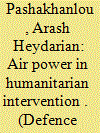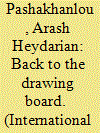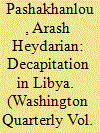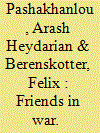| Srl | Item |
| 1 |
ID:
157988


|
|
|
|
|
| Summary/Abstract |
It would be hard to overstate the importance of air power in humanitarian intervention (HI) and the Responsibility to Protect (R2P). Yet, the role of air power in HI and R2P has been understudied. This article seeks to remedy the lack of systematic investigation. It does so by developing a framework for assessing the effectiveness of air power during military operations in HI and R2P and applies it to NATO’s air campaigns in Kosovo (Operation Allied Force) and Libya (Operation Unified Protector). Upon examination NATO is revealed to have fared better in Libya than Kosovo in positively accomplishing its stated humanitarian objectives, minimizing collateral damage and reducing the costs for the interveners, all of which are aspects considered by the model. The relative effectiveness of Operations Unified Protector is generally attributed to geography, diplomacy and technology. It is argued that better ground support, unmanned aerial vehicles (UAVs) and burden sharing are needed to enhance the utility of air power in HI and R2P even further.
|
|
|
|
|
|
|
|
|
|
|
|
|
|
|
|
| 2 |
ID:
121860


|
|
|
|
|
| Publication |
2013.
|
| Summary/Abstract |
Offensive realism argues that states committed to survive are nevertheless condemned to participate in a relentless struggle for power, and it holds the structure of the international system as the cause of this tragic outcome. This article subjects the logic behind this tragic worldview and the explanatory power of offensive realism to a careful and comprehensive scrutiny. This in-depth analysis of offensive realism amounts to a substantial critique of the theory as it fails to logically generate the brutish world it presupposes and is plagued by significant shortcomings in its explanatory model. These findings suggest that offensive realism cannot provide useful theoretical lenses for explaining and understanding international politics, even when it is assessed on its own terms.
|
|
|
|
|
|
|
|
|
|
|
|
|
|
|
|
| 3 |
ID:
157282


|
|
|
|
|
| Summary/Abstract |
According to the strategy of decapitation, the best way to defeat a nation is by attacking its civilian and/or military leadership. Without it, the enemy can no longer fight effectively due to lack of direction and strategy-making capacity. Hence, the leadership is akin to the brain of the body in this view: without it, the rest of the organs can no longer function at the strategic level. Specifically, the objective of decapitation is to kill, overthrow or isolate the enemy regime by striking a small number of crucial leadership targets.1
1. John Warden, “The Enemy as a System,” Airpower Journal 9, no. 1 (1995): 40–55.
View all notes
The end goal is to win wars rapidly with minimal commitment of resources and risk of life, low collateral damage and minimal or no friendly casualties.
|
|
|
|
|
|
|
|
|
|
|
|
|
|
|
|
| 4 |
ID:
178179


|
|
|
|
|
| Summary/Abstract |
This article scrutinizes the assumption that friends support each other in times of war. Picking up the notion that solidarity, or ‘other-help’, is a key feature of friendship between states, the article explores how states behave when a friend is attacked by an overwhelming enemy. It directs attention to the trade-off between solidarity and self-help that governments face in such a situation and makes the novel argument that the decision about whether and how to support the friend is significantly influenced by assessments of the distribution of material capabilities and the relationship the state has with the aggressor. This proposition is supported empirically in an examination of Sweden’s response to its Nordic friends’ need for help during the Second World War – to Finland during the 1939–1940 ‘Winter War’ with the Soviet Union, and to Norway following the invasion of Germany from 1940 to 1945.
|
|
|
|
|
|
|
|
|
|
|
|
|
|
|
|